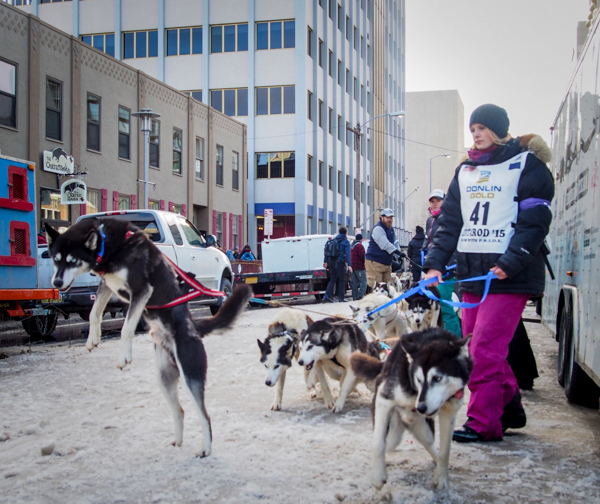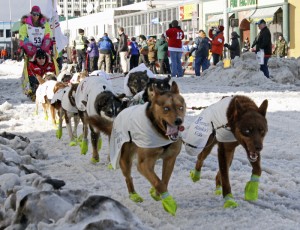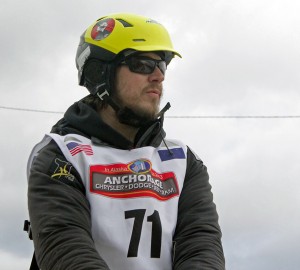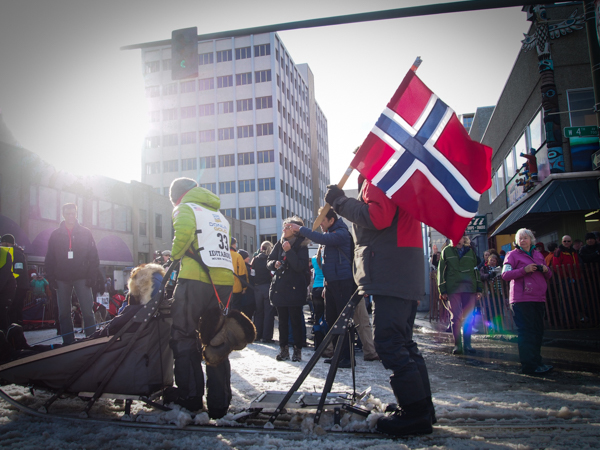
The Ceremonial start of the 43rd Iditarod filled Downtown Anchorage with dogs, fans, and snow trucked in from Goose Lake.
Unusually warm weather has hampered Southcentral Alaska’s winter snowpack and led officials to move the race start to Fairbanks for only the second time ever. The new route through the Interior will challenge even the most tenured seasoned racers as long-held strategies are scrambled.
Light morning rain and temperatures in the upper-30s Saturday morning were yet another reminder: it hasn’t been a good season for mushers in Southcentral Alaska. Reliable training grounds like Willow, where many prominent veterans keep kennels, all the way down to Kasilof have been without good snow to put miles on their teams. That’s led many, like 2014 finisher Monica Zappa, to spend winter on the move.
“We’ve basically been living out of our truck, we haven’t been able to train at home on the Kenai Peninsula for 2 and a half months, so we actually ended up going to Wyoming,” Zappa said.

While the switch in start locations may seem like an advantage for Interior mushers clustered around Fairbanks, many teams moved up there for part of the season to take advantage of the snow. And with the first leg of this year’s route following smooth, fast rivers rather than the technical climb and decent through the Alaska Range in past years, veteran Richie Diehl says the terrain isn’t to any one region’s advantage.
“I’m from Aniak on the Kuskokwim River, so I love river traveling,” he said.
But long stetches on the Chena and Nenana rivers so early on present new challenges. Paige Drobny will be pacing her team in the first leg of the race.
“I’m gonna make sure to have my GPS on so that I don’t let them go any faster than 10 miles per hour, is my speed, because it’s flat and straight it’s really easy to let them run, and I think you can burn ’em out if you do that,” Drobny said.
The other confounding variable is the distance between checkpoints. Iditarod mushers who design strategies around sprinting from one stop to the next will have a difficult time making it all 119 miles from Tanana to Ruby without stopping. And that, says Lisbett Norris, means making plans to camp.
“I packed an extra caribou skin, in addition to my regular sleeping pad, ’cause I want to be comfortable and cozy,” Norris said.

There is one other long-distance sled-dog race where stretches on rivers and camping on the trail are the norm, and that’s the Yukon Quest. While Brent Sass of Eureka has only run the Iditarod twice before, he’s run the Quest 9 times and just a few weeks ago came in first.
“Yeah, camping out is one of my main deals, I love camping out on the trail, and I’ll be doing the same thing: building a big fire every stop I can,” Sass said.
Few mushers at the Ceremonial Start would reveal the details of their layover strategies—which is par for the course in a race where psychological advantages are their own tactic. But there are also some unknowns in the weather forecast, as temperatures are projected to drop to twenty below with a possibility of heavy snow. And for Kelly Maixner, changes in the layover rules are yet another variable to contend with.

“We do have a different option this year of taking our 8 before our 24,” Maixner said. “So I’ll just have to get out there and assess the situation, it’s kind of gonna be an on-the-fly race this year for me.”
In a year with so many adjustments, the one change that mushers across the board, like Hugh Neff of Tok, are looking forward to is the race’s first ever stop in Huslia, home to George Atla who passed away just last month.
“Ya know, George Atla is the greatest dog-musher ever, and we’re honoring his spirit this year,” Neff said.
The festivities were marred by the death of a sled-dog not involved in the ceremonial start. One of the dogs belonging to Lachlan Clarke, a race veteran from Colorado, got loose from the staging area at Campbell Tract, and was hit by a car several hours later.
The race’s official start is at 10 a.m. Monday.
Zachariah Hughes reports on city & state politics, arts & culture, drugs, and military affairs in Anchorage and South Central Alaska.
@ZachHughesAK About Zachariah




